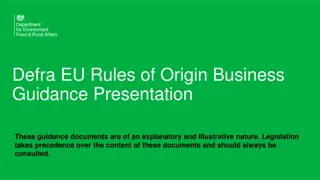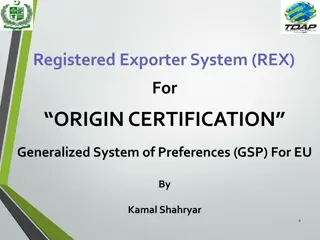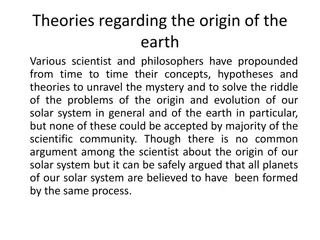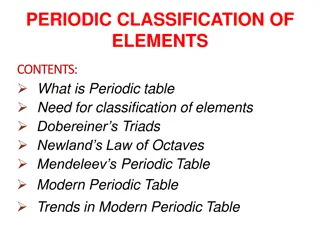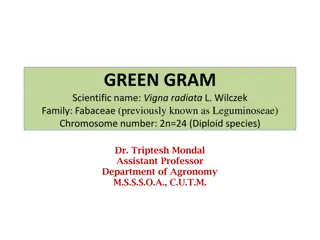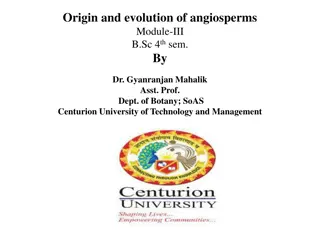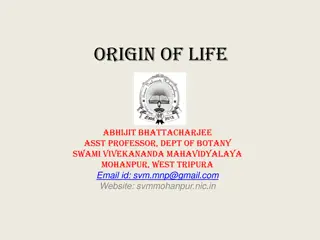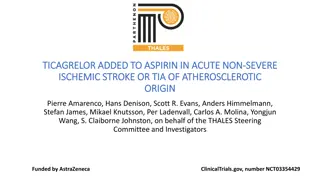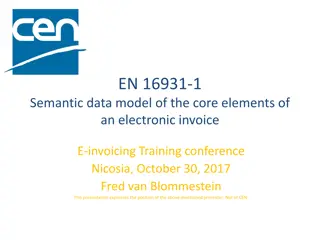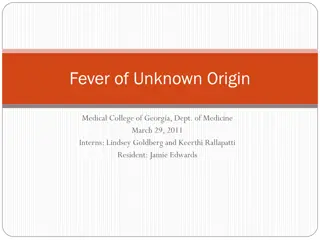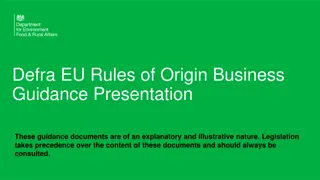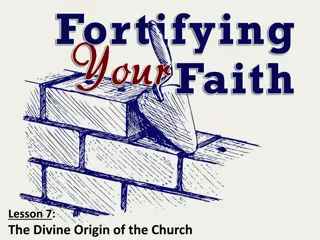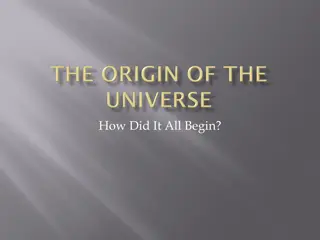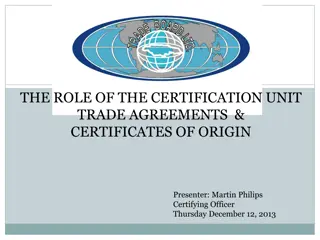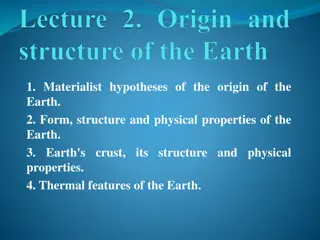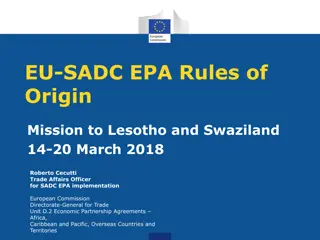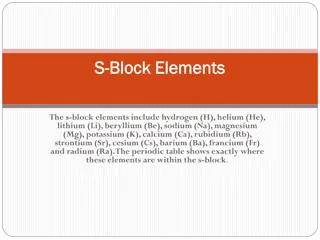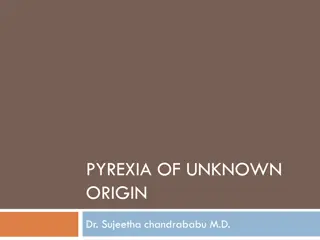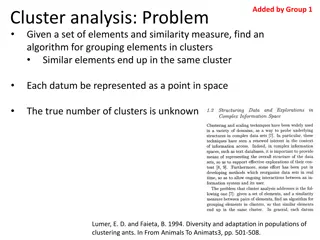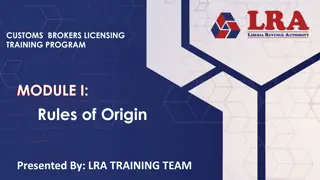Latin Origin Words with the /s/ Sound Spelled "sc" Activities
Engage students in identifying and exploring words with the /s/ sound spelled "sc," which have Latin origin. This educational material includes teaching activities, independent tasks, and spelling rules to enhance understanding of words like science, ascend, scenery, and more. Students delve into de
3 views • 6 slides
The Periodic Table and Chemical Bonds in Physical Science
The periodic table organizes elements based on their properties, with rows representing periods and columns representing groups. Mendeleev's early table laid the foundation for predicting undiscovered elements. Today's periodic table orders elements by atomic number, showcasing the periodic law and
3 views • 15 slides
OCEAN FREIGHT INSURANCE | ENSURING SHIPMENT PROTECTION FROM ORIGIN TO DESTINATIO
Ocean freight insurance is vital for protecting shipments from origin to destination, ensuring peace of mind for shippers. This type of insurance covers potential risks such as damage, loss, theft, or delays that can occur during ocean transit. Given the complexities and unpredictability of internat
1 views • 1 slides
The Origin of Viruses: Theories and Evidence
Viruses are acellular parasites with a complex replication mechanism. Studies on their origin present challenges due to the lack of fossils. Three main hypotheses include regressive, cellular origin, and co-evolution. The regressive hypothesis suggests viruses originated from complex ancestors that
3 views • 25 slides
Rules of Origin and Tariff-Free Trading with the EU
Rules of Origin (RoO) determine the economic nationality of a product, impacting tariffs and restrictions. To trade tariff-free with the EU, compliance with RoO is crucial. Specific rules dictate ingredient sourcing, with certification processes ensuring eligibility for tariff reductions. Certain pr
0 views • 19 slides
Theories on the Origin of State: Divine, Force, Patriarchal, and More
Various theories such as Divine Origin, Force Theory, Patriarchal Theory, and others explain the origin of the state. Divine theories attribute state creation to God, while Force Theory emphasizes the strong subjugating the weak to establish authority. Each theory offers unique perspectives on the h
1 views • 24 slides
Overview of Registered Exporter System (REX) for Origin Certification under Generalized System of Preferences (GSP) for EU
REX is a self-certification system allowing registered exporters to declare the origin of goods. This system simplifies the process by enabling exporters to issue a Statement on Origin (SOO) themselves. Eligible entities in Pakistan can register under REX, ensuring compliance with EU Customs Regulat
0 views • 26 slides
Theories on the Origin of Earth and Solar System
Scientists and philosophers have proposed various theories regarding the origin of Earth and our solar system, with concepts ranging from evolutionary to catastrophic. The Dust gas cloud theory, Planetesimal hypothesis, Binary star hypothesis, and more have been suggested to explain how planets were
4 views • 7 slides
Evolution of Periodic Table and Classification of Elements
The Periodic Table is a systematic arrangement of elements based on atomic number and properties. Over time, chemists developed various classification methods such as Dobereiner's Triads, Newland's Law of Octaves, Mendeleev's Periodic Table, and the Modern Periodic Table to organize the increasing n
1 views • 26 slides
Country of Origin Determination by U.S. Customs
The country of origin for exports is a crucial aspect in international trade, especially for goods exported to the U.S. This article delves into how U.S. Customs determines the actual country of origin, the implications of origin fraud, and the warning against illegitimate practices. It sheds light
1 views • 18 slides
Technical Soundness of EU-SADC EPA Rules of Origin
The implementation and technical soundness of Rules of Origin under the EU-SADC EPA are crucial for the utilization of trade preferences. Compliance with rules of origin is essential for receiving tariff preferences, but drafting these rules accurately is challenging. Recommendations include specify
4 views • 12 slides
Overview of Green Gram (Vigna radiata L.): Economic Importance, Origin, and Classification
Green gram, scientifically known as Vigna radiata L., is a highly digestible pulse crop with various uses such as consumption as whole grains or dal, making flour for cakes, and as fodder for cattle. It is grown widely in Southern Asia and other countries, with India being a significant producer. Gr
0 views • 23 slides
Origin and Evolution of Angiosperms: Insights into Their Phylogenetic Origins
Undisputed fossil records reveal the significant appearance and diversification of angiosperms during the Mesozoic era. The debate on the origin of angiosperms revolves around their monophyletic versus polyphyletic nature. While some argue for a monophyletic origin based on shared characteristics, o
1 views • 5 slides
The Origin of Life and Plants: Insights from Abhijit Bhattacharjee, Asst. Professor of Botany
Explore the mysteries surrounding the origin of life and Earth, as discussed by Abhijit Bhattacharjee, an Assistant Professor in the Department of Botany. Delve into the concept of life being an urge of the Universe to understand itself and the intriguing hypothetical views on life's origins. Learn
0 views • 14 slides
Ticagrelor Added to Aspirin in Acute Non-Severe Ischemic Stroke or TIA of Atherosclerotic Origin
Among patients with transient ischemic attack (TIA) or minor ischemic strokes, adding ticagrelor to aspirin has shown superior efficacy in preventing stroke or death, particularly in those with ipsilateral atherosclerotic stenosis. The THALES trial demonstrated that ticagrelor added to aspirin was m
1 views • 14 slides
D-Block Elements: Properties and Classification in Chemistry
Welcome to the Department of Chemistry at Kisan Veer Mahavidyalaya, Wai. Explore the Chemistry of Elements of the 3d series, focusing on d-Block Elements and Transition Elements. Learn about their electronic structure, colored ions, magnetic properties, oxidation states, and complex formation. Under
0 views • 34 slides
Exploring the World of Food: From Animal to Plant Origins
Discover the diverse world of food, from animal origin with meats, fish, and dairy products to plant origin with vegetables, pulses, nuts, and fruits. Learn about different food groups, their nutritional benefits, and the importance of a balanced diet for a healthy lifestyle.
0 views • 26 slides
Web Security: Cross-Origin Resource Sharing & Same-Origin Policy
Exploring the concepts of Cross-Origin Resource Sharing (CORS) and Same-Origin Policy (SOP) in web security, including their implications on data sharing between different origins and how browsers enforce security restrictions to prevent unauthorized access.
0 views • 22 slides
The Seal of Origin Program in Chile
The Seal of Origin Program in Chile aims to add value to traditional products by emphasizing their specific geographical origins and unique qualities. It includes seals, geographical indications, appellations of origin, and certification marks to highlight the authenticity and standards of products.
0 views • 31 slides
Semantic Data Model of Electronic Invoicing Core Elements
Presentation by Fred van Blommestein on the EN16931-1 semantic data model of core elements in electronic invoicing, covering invoice processes, core invoice design, semantic model details, business rules, and invoicing principles. The model includes 160 elements in 33 groups, with mandatory elements
0 views • 13 slides
Complex Case Study of Fever of Unknown Origin in a Patient with Multiple Sclerosis
A 42-year-old African American male with a history of Multiple Sclerosis presented with a fever of unknown origin, challenging the medical team to identify the underlying cause despite multiple investigations, treatments, and consultations. His complex medical history, including prior UTI treatment
0 views • 19 slides
House Judiciary Committee Proposal for Origin Rules & Revenue Return
House Judiciary Committee proposes principles for interstate taxation, focusing on tax relief, simplicity, tech neutrality, tax competition, states' rights, and privacy. It discusses implementing origin sourcing and a multistate compact to ensure fair taxation for online sales. The compact incentivi
0 views • 13 slides
Rules of Origin in EU-UK Trade
Rules of Origin (RoO) are essential in determining the economic nationality of products for tariff classification in EU-UK trade. Compliance with RoO is necessary for accessing preferential tariff rates under free trade agreements. This guidance outlines the principles, conditions, and requirements
0 views • 19 slides
The Divine Origin of the Church: Unveiling Biblical Prophecies
Understanding the divine origin of the church is essential for grasping its significance. This lesson delves into the timeless purpose and prophetic foundations of the church, emphasizing its establishment according to God's eternal plan as foretold in the Old Testament by prophets like Daniel and I
0 views • 12 slides
Exploring the World of Matter and Elements
Matter is the physical "stuff" of the universe, encompassing elements that make up rocks, wood, air, metals, water, and living organisms. Chemical elements are the building blocks of matter, with essential elements like oxygen, carbon, hydrogen, and nitrogen constituting a significant part of living
0 views • 24 slides
The Origin of the Universe: A Journey Through Scientific Theories and Discoveries
The concept of the universe's beginning has evolved over time, with early beliefs in its eternal nature shifting to the acknowledgment of a starting point. Pioneering scientists like Albert Einstein and Sir Fred Hoyle contributed to this transformative understanding, challenging traditional views. E
0 views • 27 slides
Enhancing Interdomain Routing Security with RPKI
This content explores the deployment and security aspects of Resource Public Key Infrastructure (RPKI), a system that maps IP prefixes to their owning organizations to prevent prefix/subprefix hijacks. It delves into prefix and subprefix hijacking scenarios, certifying ownership with RPKI, and how R
0 views • 29 slides
The Role of Certification Unit in Trade Agreements & Certificates of Origin
The Trade Board Limited, a government agency, plays a crucial role in issuing Certificates of Origin and import/export licenses for Jamaican products. They ensure compliance with trade agreements, facilitate e-transactions, and promote secure frameworks. The mission is to enhance local and internati
0 views • 62 slides
The Law of Torts: Origin, Theories, and Objectives
Exploring the origin, theories, definition, objectives, history, and development of the law of torts. From the French origin of the word "tort" to the primary objectives of providing relief, imposing liability, and deterring harmful acts, this branch of law plays a crucial role in addressing civil w
0 views • 15 slides
Hypotheses on the Origin of Earth and Earth's Formation
Various materialist hypotheses proposed by scientists such as Kant, Laplace, Schmidt, and Fesenkov regarding the origin of Earth and the solar system. These hypotheses suggest different processes, including the formation from primary dusty matter, hot nebula, interstellar meteorite dust, and gas-dus
0 views • 16 slides
Rules of Origin in Trade Agreements
Rules of origin play a crucial role in determining the national source of a product, certifying its origin, and securing preferential treatment under trade agreements. This includes defining where goods are produced and how they are made, with specific criteria for each case. Preferential rules of o
0 views • 15 slides
The Fascinating Story of Lord Ganesh: Birth, Appearance, and Roles
Discover the intriguing tale of Lord Ganesh, the Elephant God in Hindu mythology. Born from Parvati's bath residue, Ganesh faced unique challenges and was blessed by Shiva with extraordinary powers. With a unique appearance and a role as the remover of obstacles and God of Good Luck, Ganesh holds a
0 views • 17 slides
Web Security Fundamentals: Understanding the Same Origin Policy
Explore the basic principles of web security focusing on the Same Origin Policy, operating system analogies, isolation of content sources, browser sandboxing, and setting cookies securely by servers. Learn how these concepts help ensure a safe browsing experience and prevent common vulnerabilities l
0 views • 37 slides
Web Security: Same-Origin Policy in Web Applications
In web development, the Same-Origin Policy plays a crucial role in ensuring the security of web applications by restricting how documents or scripts loaded from one origin can interact with resources from another origin. This policy helps prevent malicious attacks such as Cross-Origin Request Forger
0 views • 25 slides
S-Block Elements in the Periodic Table
The s-block elements in the Periodic Table consist of 14 elements with unique properties and characteristics. Lithium, sodium, and potassium are notable members of Group 1, characterized by their reactivity and ability to form alkaline solutions when in contact with water. These soft metals exhibit
0 views • 23 slides
Pyrexia of Unknown Origin: Causes and Classification
Pyrexia of unknown origin (PUO) is a challenging diagnostic scenario characterized by persistent fever without an identified cause. Dr. Sujeetha Chandrababu M.D. defined PUO as temperatures exceeding 38.3°C for several weeks with no definitive diagnosis. Classification of PUO includes various categ
0 views • 43 slides
Aerobic Gymnastics Competition Guidelines and Rules
The guidelines for aerobic gymnastics competitions include compulsory elements, categories, competition spaces, deductions, and specific rules for different age groups. The competitions have specific parameters for elements allowed, lifting, floor elements, music length, maximum difficulty elements,
1 views • 17 slides
Cluster Analysis: Grouping Elements into Clusters with Similarity Measures
Given a set of elements and a similarity measure, the algorithm aims to group elements into clusters where similar elements are grouped together. Each element is represented as a point in space, and the true number of clusters is unknown. The clustering algorithm is inspired by the behavior of ants
0 views • 15 slides
Rules of Origin
Delve into the legal framework, scope, and principles of Rules of Origin (RO) in this comprehensive training module. Learn about origin conferring criteria, proof of origin, and key concepts like substantial transformation and de minimis. Strengthen your knowledge to excel in the Customs Brokers Lic
0 views • 67 slides
Revision of Pan-Euro-Med Rules of Origin in Textile and Clothing Industry
The revision in Pan-Euro-Med rules of origin in the textile and clothing sector aims to enhance the ennoblement and finishing sector, increase availability of finished fabrics locally, and support industry competitiveness. Findings indicate the importance of ennoblement - a process involving prepara
0 views • 9 slides




